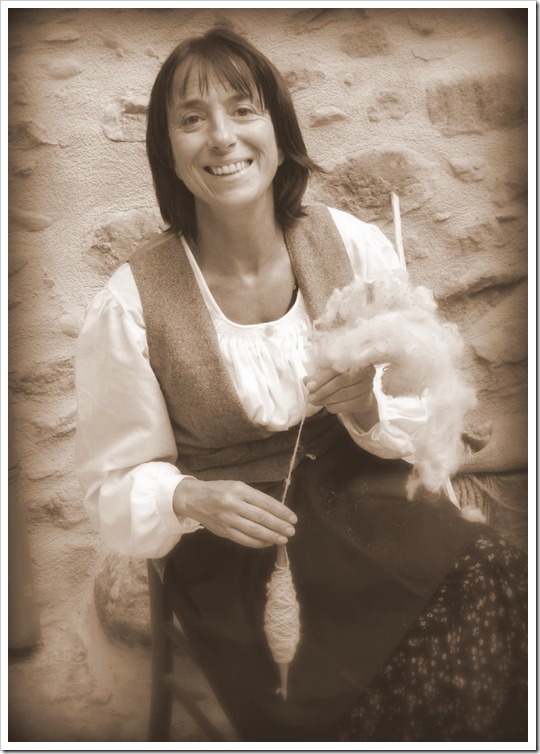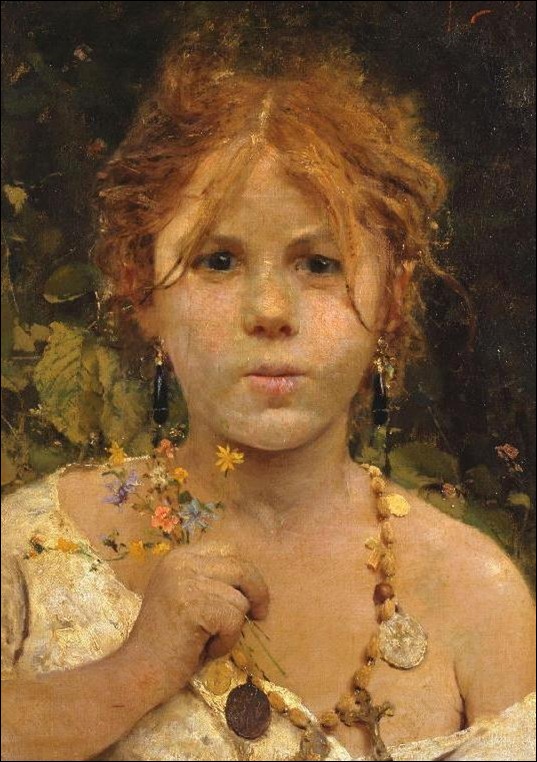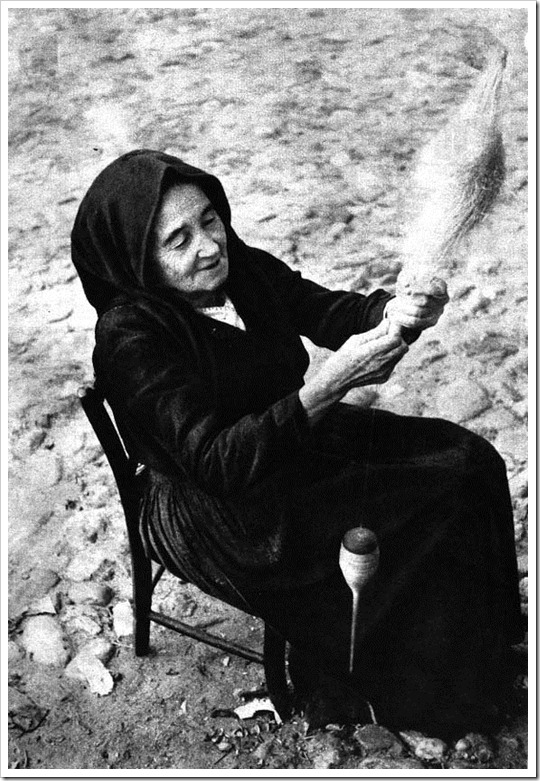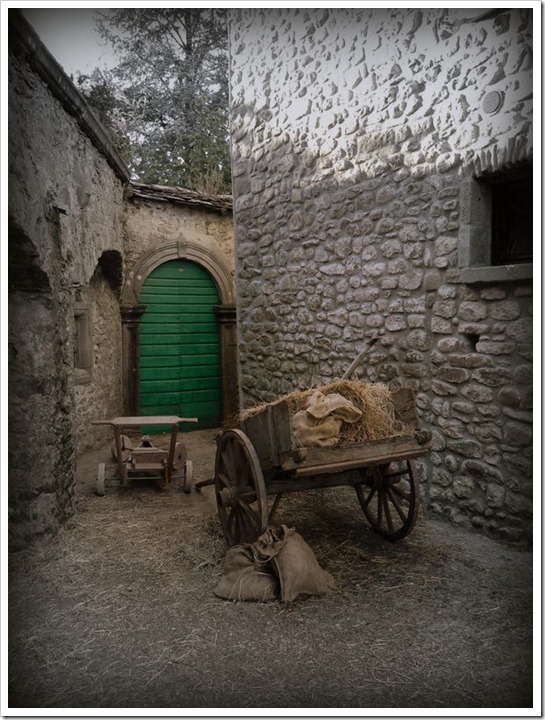The other day, when I was weaving with Clara and Vincenza at the festival of Antichi Mestieri in Ponticello, Vincenza, watching Clara spinning the wool, began reciting a famous poem that we all studied at school: “Siede con le vicine su la scala a filar la vecchierella”. The poem is called Il Sabato del Villaggio by Giacomo Leopardi (1798 – 1837), and here below is the first verse with an excellent English translation by AS Kline. You can find the whole poem, together with many others, on Kline’s Free Poetry Archive: Poetry in Translation.
 |
| Clara, alla filatura della lana. Photo: Geoff Chamberlain ©2014 |
To make it a bit easier to link the original Italian poem with the English translation, we’ve split the verse into four sections.
Il Sabato del Villaggio – Saturday Night in the Village
La donzelletta vien dalla campagna
in sul calar del sole,
col suo fascio dell’erba; e reca in mano
un mazzolin di rose e viole,
onde, siccome suole, ornare ella si appresta
dimani, al dí di festa, il petto e il crine.
The girl comes from the fields,
at sunset,
carrying her sheaf of grass: in her fingers
a bunch of violets and roses:
she’s ready, as before,
to wreathe her hair and bodice,
for tomorrow’s holiday.
 |
| Fanciulla abruzzese, by Francesco Paolo Michetti (1851 – 1929) |
Siede con le vicine
su la scala a filar la vecchierella,
incontro là dove si perde il giorno;
e novellando vien del suo buon tempo,
quando ai dí della festa ella si ornava,
ed ancor sana e snella
solea danzar la sera intra di quei
ch’ebbe compagni nell’età piú bella.
The old woman sits spinning,
facing the dying sunlight,
on the stairway, with her neighbours,
telling the tale of her own young days,
when she dressed for the festival,
and still slim and lovely,
danced all evening, with those young
boys, companions of her fairer season.
 |
| La filatrice. Photo: Anon. |
Già tutta l’aria imbruna,
torna azzurro il sereno, e tornan l’ombre
giú da’ colli e da’ tetti,
al biancheggiar della recente luna.
Or la squilla dà segno
della festa che viene;
ed a quel suon diresti
che il cor si riconforta.
Already the whole sky darkens,
the air turns deep blue: already
shadows of hills and roofs return,
on the young moon’s pale rising.
Now the bells are witness
to the coming holiday:
you would say the heart
might take comfort from the sound.
 |
| Uno scorcio di Ponticello. Photo by Geoff Chamberlain ©2014 |
I fanciulli gridando
su la piazzuola in frotta,
e qua e là saltando,
fanno un lieto romore;
e intanto riede alla sua parca mensa,
fischiando, il zappatore,
e seco pensa al dí del suo riposo.
A gang of little boys
shout in the tiny square,
leaping here and there,
making a happy din:
and the farmhand, whistling,
returns for his simple meal,
dreams of his day of rest.









Comments:
Laura:
Hi Serena! I think that it isn’t kind of you to write”…watching Clara …” and immediately after to speak about ” la vecchierella” . ^_*! Seriously I’ am a beginner in English. to improve this language, sometimes I use Conversation Exchange with Italian learners. In your blog I often find the answers to explain them my beautiful Italian. Thanks
RITA KOSTOPOULOS:
‘Il sabato del Villaggio” mi ha riportato alla mia gioventu’ quando frequentavo il ginnasio Tommaso Campanella di Reggio Calabria con la mia professaressa di lettere, signora Cimino. Una delle mie piu’ gradite poesie che a quel tempo si studiavano e si imparavano a memoria. Moltissime grazie per il ricordo. Rita
Serena:
@RITA KOSTOPOULOS Salve Rita, mi fa piacere che questa bellissima poesia ti abbia riportato alla tua gioventù. Ci vai mai a Reggio Calabria? Pensa che io non sono mai stata in Calabria, spero un giorno di visitarla. Conosco solo i suoi “ambasciatori” più famosi perché li vidi a Firenze quando finirono di restaurarli.
Un saluto affettuoso
Serena
Lee:
Serena,
Grazie per questo. Mi ha portato alla mente un scioglilingua dalla mia giovinezza, ma non so proprio perchè.
She sells seashells by the sea shore.
(Lei vende conchiglie in riva al mare)
Hai fatto mai un blog su di questi in italia? Sarebbe interessante. 🙂
Serena:
@Lee Salve Lee!
Mi incuriosisce molto sapere come questa famosa poesia di Leopardi ti abbia fatto pensare ad uno scioglilingua. Conosco questo tongue twister inglese perché Geoff lo cita spesso. Qualche anno fa abiamo scritto un post su un paio di scioglilingua, ecco il link: https://blogs.transparent.com/italian/parole-curiose/
Se me ne viene in mente un altro scrivo un nuovo articolo.
Saluti da Serena